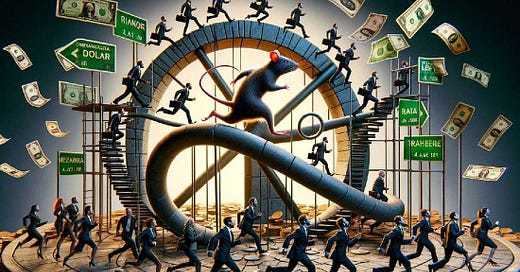I've been mulling over an idea for many days now, relentlessly turning it over in my mind: how to escape the rat race. That race where we pursue a demanding college degree, which bears little resemblance to the job market, and once we enter that job market, we never stop working.
We work every day from 9-7, and on top of that, you have to check your email over the weekend in case something has happened.
For those who have read Jim Loehr's Managing Energy, Not Time, is the Key to High Performance, Health and Happiness, you'll know that being productive is about focusing on certain things in a way that yields optimal results.
This is what most people do when they focus on their work routine, so by the time they get home, they have no desire to spend time with their partner or their children, which translates to a rather sad life.
What has been nagging at me for a while is that with this rather foolish method, you'll never be able to escape the rat race.
Therefore, your chances of succeeding by doing that are zero percent.
How can it be that you repeat something constantly, without your chances of breaking free from it increasing:
"It's just the way it is"
"It's the system"
"I'm not cut out for anything else"
No matter how much I write, I can't explain it to myself. We live in a society where we're going to be tied to a job forever (forget about pensions) and where no one considers escaping. Let me tell you, this is very much akin to the mindset of slaves many centuries ago.
It's at that moment when I think about what alternatives exist, and three come to mind:
1. Become an entrepreneur:
This is the method that has always existed. If you want to escape the rat race, make others "your rats." I don't care if you sell software or services, the concept is very similar.
This method involves doing something that allows you to grow enough to escape the rat race.
The problems I see with this model are several:
In most countries, entrepreneurs are deemed cruel, or so say the governments, so to win votes, they're subjected to completely inhumane tax conditions. You know what happens when you have the government as an enemy, right? You usually lose.
In most cases, the rat race is leveraged. If the business is yours, and you don't work, there's very little chance of it doing well. I'd dare say there's a zero percent chance.
A large part of businesses disappear within a few years. This forces their creators to return to the initial rat race.
The initial investment and risk are very high. Generally, if you sell products, you have to advance a large part of the capital or, alternatively, apply for lines of credit.
It's true that those who have had the tremendous luck (or have worked hard enough) for it to go well now live a dream life. We always have the examples of Jeff Bezos and some others. However, the risk/reward is very high, and no one can assure you that it will turn out well.
2. Have an asymmetrical portfolio:
As an investor investing in the S&P 500, you'll never get out. I'm telling you that before we start. It's impossible. However, it's a good alternative to have a pension and be able to stop working at 67 instead of 80.
Yet, with ordinary returns, you'll never escape.
However, if you have asymmetrical returns, then you will be able to escape. These returns are achieved by mixing very high-risk assets (5% of the portfolio) with very low-risk assets (95% of the portfolio). This allows us to have many more advantages than disadvantages.
If I was talking about the problems before, now I'm talking about the advantages:
It will always work out, if you have enough patience, a black swan event will eventually come. It may take 12 or 30 years, but it will come. (e.g., from 2008 to Covid took 12 years).
You can improve your pension as you expose yourself to risks. Those who follow know that we've achieved returns much higher than the S&P 500 with less risk while still being exposed to black swan events.
The average investor spends about 2 hours per month. In the case of investment, something very curious happens, which is the opposite of what happens in the business world: "the less, the better." If you spend more than 2 hours a month, you will have poor returns.
On the other hand, in the 0.01% of businesses that succeed, the outcome is infinitely greater than in this scenario. Now, do you think you need all that money? Or is escaping the rat race enough?



